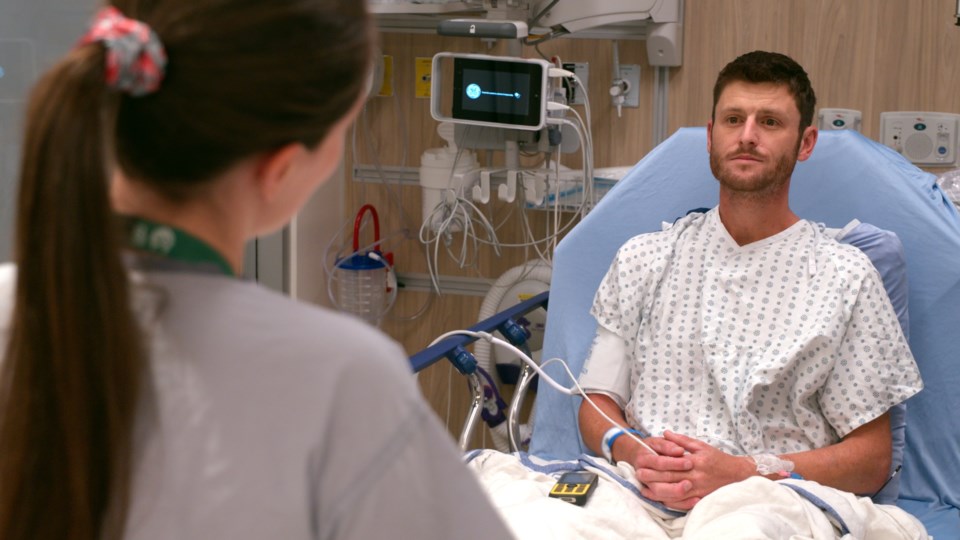Brett Green was 21 years old when he first found out he would eventually need a liver transplant due to a rare, chronic liver disease called primary sclerosing cholangitis (PSC).
Ten years later, an alignment of circumstances finally went in the qathet region resident’s favour and he received the transplant he very much needed. Green's story will be the first episode in a screening on November 19.
"I got diagnosed in 2013 and I started seeing a gastroenterologist in Vancouver named Eric Lam," said Green. "He would do maintenance procedures to keep me going for a little longer, until I got to a point where I needed a transplant."
Although thousands of successful organ transplants happen every year in Canada, each one requires a rare alignment of circumstance, biology, teamwork, expertise and technology.
After multiple failed attempts at a transplant, finally in January of 2024, Green's luck changed. After a successful transplant, he and his wife and baby daughter could start living a semblance of a normal life once again.
"So basically, I had to wait for somebody to pass away and then take their entire liver," said Green. "There are a lot of things that need to line up for matches; blood type is definitely a big one, but there are other things as well."
Green said when his symptoms started to worsen, causing insomnia and forcing him off work, his medical team started going through the pre-liver transplant tests and they ended up stumbling across a couple of heart conditions.
"I had an atrial septal defect (ASD), which basically means there's a hole in my heart," said Green. "They [medical team] said my heart wasn't going to be strong enough for a liver transplant, and so we had to do heart surgery first."
Once Green recovered, he was put back onto the transplant list. However, after his team conducted more medical assessments, and saw that Green was recovering so well, they believed it was possible he no longer needed the transplant.
"Then, within three weeks [the hospital] phoned me and said it was go-time," said Green. "So we came down [from qathet to Vancouver], got all set up in the operating room, ready to go, and then the liver ended up not being viable."
Green said he didn't know at the time that most transplants only have a 50 per cent chance of being a successful match, due to multiple factors.
"That was definitely a tough thing to hear, because I was so certain it was happening," said Green. "It felt like my life was being taken away from me, and I was losing who I was, because I wasn't able to do the activities that made me, such as work and hobbies."
Green said his wife really struggled as well, because every phone call could potentially be from the hospital saying it was time to try again.
"The morning of my open heart surgery, we found out we were pregnant; that was a pretty special gift," said Green.
The second time Green's transplant was rejected and he was sent home to qathet, he said it was a little easier to accept because now he felt more prepared, and had more of an understanding of how common it is for a transplant to not be viable.
But, the third time's a charm, and in January of this year, he flew back to Vancouver and finally the liver transplant was a success.
"It's been a much slower [recovery] process than I expected it was going to be," said Green. "I was feeling amazing, but when things started settling down and we got out of the hospital, I realized that I didn't have the energy yet [to do activities he used to do, like hiking]."
Green said he's still trying to figure out his boundaries and what types of activities he can do without overdoing it.
"I'm definitely way better than before the transplant and I notice continuous growth," said Green. "I like mountain biking, rock climbing, hunting, and definitely being able to be more active with my family, my daughter and my wife."
As for his mental health Green said he has always tried to have a positive attitude about his circumstances.
"I have to accept that my new normal might be different than what I'm used to," said Green. "It also helps that I have so much support from my family, especially my brother."
Green said he agreed to take part in the Knowledge Network series Transplant Stories, which will premiere on November 19, because he wants to raise awareness.
"I was quite nervous about it, but I finally decided it was something I had to do," said Green. "It was just such a good cause. I wanted to be able to raise awareness about what it takes to have a transplant and how easy it is to declare yourself as a donor."
Green said to become a donor, all people have to do is take a but many people don't realize how easy it is.
"Now, I get a second chance at life again," said Green.
A synopsis of the TV series describes as, "a four-episode series that reveals unprecedented access to transplant patients’ harrowing experiences, and rarely seen footage from the operating room.”
Green is one of the subjects in the first episode of the four-part series produced by Vancouver production company The broadcast premieres on Knowledge Network starting November 19, and can be streamed online for free, across Canada, at .
To register a decision about becoming an organ donor, go to the British Columbia Organ Donor Registry website: .
Join the for the top headlines right in your inbox Monday to Friday.

